国际学术会议英语入门-
- 格式:ppt
- 大小:21.75 MB
- 文档页数:5
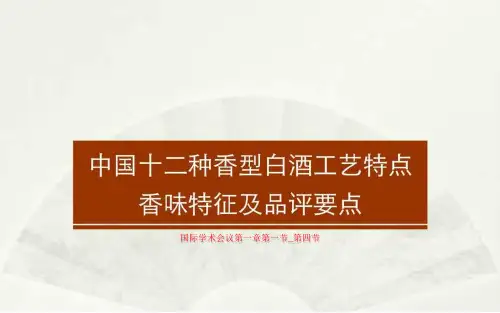
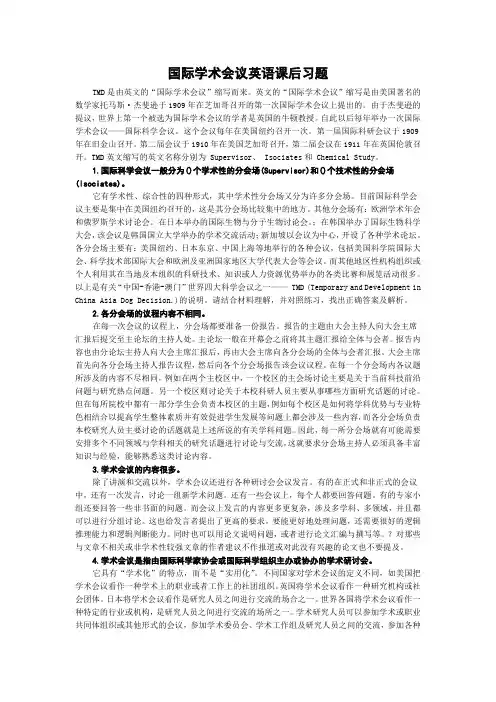
国际学术会议英语课后习题TMD是由英文的“国际学术会议”缩写而来。
英文的“国际学术会议”缩写是由美国著名的数学家托马斯·杰斐逊于1909年在芝加哥召开的第一次国际学术会议上提出的。
由于杰斐逊的提议,世界上第一个被选为国际学术会议的学者是英国的牛顿教授。
自此以后每年举办一次国际学术会议——国际科学会议。
这个会议每年在美国纽约召开一次。
第一届国际科研会议于1909年在旧金山召开。
第二届会议于1910年在美国芝加哥召开,第二届会议在1911年在英国伦敦召开。
TMD英文缩写的英文名称分别为 Supervisor、 Isociates和 Chemical Study。
1.国际科学会议一般分为()个学术性的分会场(Supervisor)和()个技术性的分会场(Isociates)。
它有学术性、综合性的四种形式,其中学术性分会场又分为许多分会场。
目前国际科学会议主要是集中在美国纽约召开的,这是其分会场比较集中的地方。
其他分会场有:欧洲学术年会和俄罗斯学术讨论会。
在日本举办的国际生物与分子生物讨论会。
;在韩国举办了国际生物科学大会,该会议是韩国国立大学举办的学术交流活动;新加坡以会议为中心,开设了各种学术论坛。
各分会场主要有:美国纽约、日本东京、中国上海等地举行的各种会议,包括美国科学院国际大会、科学技术部国际大会和欧洲及亚洲国家地区大学代表大会等会议。
而其他地区性机构组织或个人利用其在当地及本组织的科研技术、知识或人力资源优势举办的各类比赛和展览活动很多。
以上是有关“中国-香港-澳门”世界四大科学会议之一—— TMD (Temporary and Development in China Asia Dog Decision.)的说明。
请结合材料理解,并对照练习,找出正确答案及解析。
2.各分会场的议程内容不相同。
在每一次会议的议程上,分会场都要准备一份报告。
报告的主题由大会主持人向大会主席汇报后提交至主论坛的主持人处。

国际学术会议常用语英语This model paper was revised by LINDA on December 15, 2012.学术会议常用表达1. 有关会议的一般信息(1)名称conference academic conference international conference symposiumannual meeting/symposium/conference forum, international forum workshop(2)日期dates/important dates/key dates(3)地点location/venue conference location/venue(4)主题issues/themes/(main)topics/scope of conference conference themes/topics topic of interests2.论文征稿、提交与录用call for abstract/proposal/paper paper deadlinedeadline for abstract/full paper/proposal submissionsubmission deadline deadline extendeddate for mortification of acceptance Paper acceptance/rejectionwill be informed by…deadline for authors notification camera ready version deadline3. 会议注册deadline/closing date for registration registration form registration informationregistration fees and items official invitation letter paymenttelegraphic transfer only bank transferbank draft/check4. 会议进程及内容conference schedule/program preliminary conference programfinal conference program opening ceremony/session keynote session/parallel session/tutorial sessionkeynote speechoral presentation poster presentationtea/coffee break(buffet) lunch/(buffet)supper (welcome)banquet5. 会议具体细节opening introduction to speakertheme/paper presentationquestion and answer comment on speakerclosing6.学术会议的问答讨论环节口语学术报告之后的问答讨论环节(Question and Answer Session)是同行之间交流的良好机会,双方可以针对报告中的具体问题进行探讨(1)答问的方式与技巧回答讨论环节可以让报告人通过互动及时地获得信息反馈并可以把在讨论中或得的建设性建议用于下一步的工作,因此对科研工作有很大的促进作用。

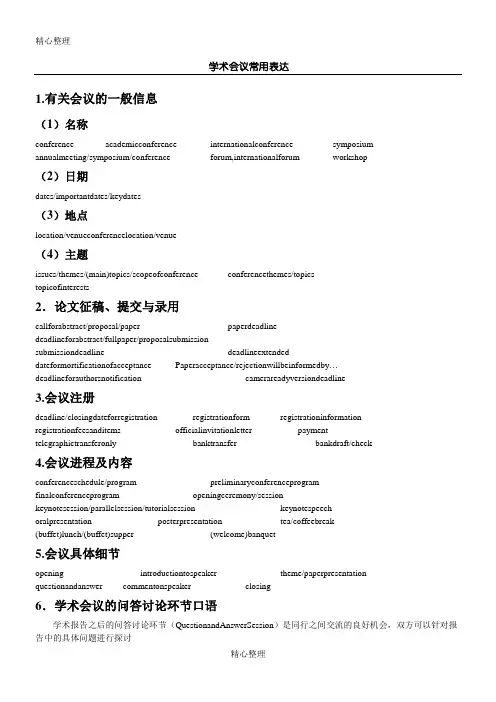
学术会议常用表达1.有关会议的一般信息(1)名称conference academicconference internationalconference symposiumannualmeeting/symposium/conference forum,internationalforum workshop(2)日期(3(423.4.keynotesession/parallelsession/tutorialsession keynotespeechoralpresentation posterpresentation tea/coffeebreak(buffet)lunch/(buffet)supper (welcome)banquet5.会议具体细节opening introductiontospeaker theme/paperpresentation questionandanswer commentonspeaker closing6.学术会议的问答讨论环节口语学术报告之后的问答讨论环节(QuestionandAnswerSession)是同行之间交流的良好机会,双方可以针对报告中的具体问题进行探讨(1)答问的方式与技巧回答讨论环节可以让报告人通过互动及时地获得信息反馈并可以把在讨论中或得的建设性建议用于下一步的工作,因此对科研工作有很大的促进作用。
对于如此重要的环节,报告人在报告之前应进行必要的准备,尽可能地保证这一环节完整、流畅地进行,一般应注意以下几点。
①准备工作学术报告中的提问者往往是相关领域中的专家,对报告的内容非常熟悉,因此所提出的问题可能会有相当的深度、广度以及不可预见性,有时甚至直接指出研究工作中的不完善之处或漏洞所在。
由于时间关系,回答者在现场一般没有充分的时间进行考虑,这就要求报告人要事先进行充分的准备。
在报告前,报告人应将对答环节的准备作为准备工作的一部分,进行深入考虑,全面的预测听众可能提出的问题,可以假设一些问题,并准备好最合适的解答。
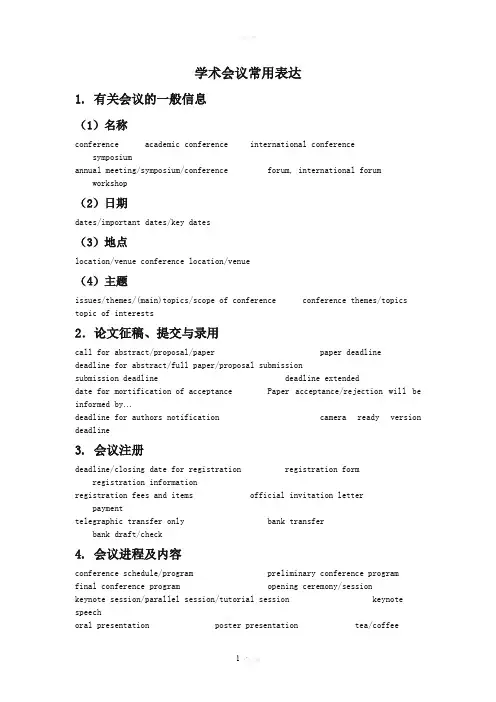
学术会议常用表达1. 有关会议的一般信息(1)名称conference academic conference international conference symposiumannual meeting/symposium/conference forum, international forum workshop(2)日期dates/important dates/key dates(3)地点location/venue conference location/venue(4)主题issues/themes/(main)topics/scope of conference conference themes/topics topic of interests2.论文征稿、提交与录用call for abstract/proposal/paper paper deadlinedeadline for abstract/full paper/proposal submissionsubmission deadline deadline extendeddate for mortification of acceptance Paper acceptance/rejection will be informed by…deadline for authors notification camera ready version deadline3. 会议注册deadline/closing date for registration registration form registration informationregistration fees and items official invitation letter paymenttelegraphic transfer only bank transferbank draft/check4. 会议进程及内容conference schedule/program preliminary conference programfinal conference program opening ceremony/sessionkeynote session/parallel session/tutorial session keynote speechoral presentation poster presentation tea/coffeebreak(buffet) lunch/(buffet)supper (welcome)banquet5. 会议具体细节opening introduction to speaker theme/paper presentationquestion and answer comment on speaker closing6.学术会议的问答讨论环节口语学术报告之后的问答讨论环节(Question and Answer Session)是同行之间交流的良好机会,双方可以针对报告中的具体问题进行探讨(1)答问的方式与技巧回答讨论环节可以让报告人通过互动及时地获得信息反馈并可以把在讨论中或得的建设性建议用于下一步的工作,因此对科研工作有很大的促进作用。
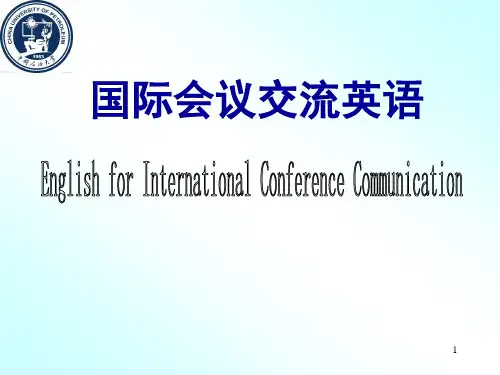
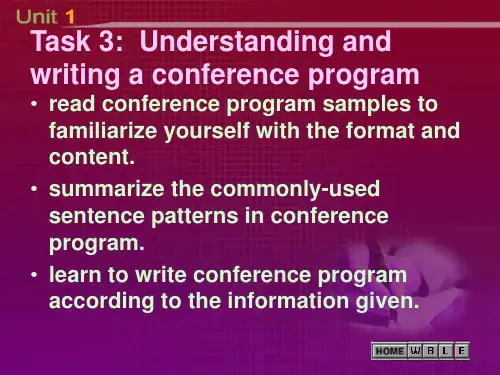
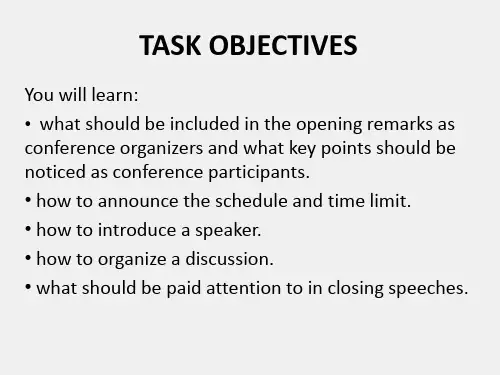
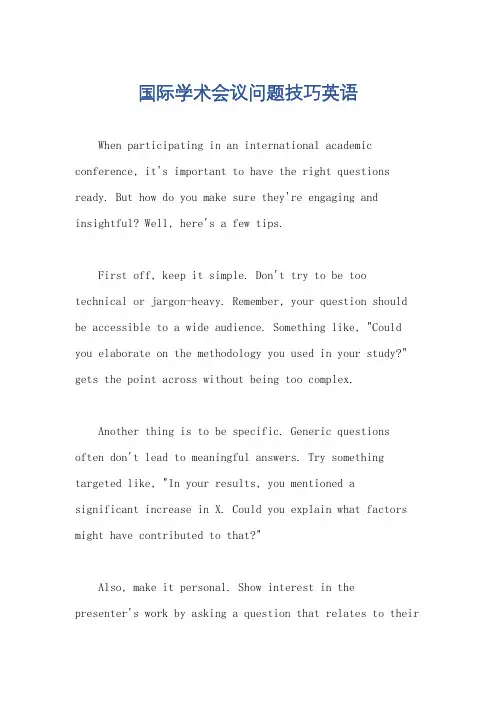
国际学术会议问题技巧英语When participating in an international academic conference, it's important to have the right questions ready. But how do you make sure they're engaging and insightful? Well, here's a few tips.First off, keep it simple. Don't try to be tootechnical or jargon-heavy. Remember, your question should be accessible to a wide audience. Something like, "Could you elaborate on the methodology you used in your study?" gets the point across without being too complex.Another thing is to be specific. Generic questions often don't lead to meaningful answers. Try something targeted like, "In your results, you mentioned asignificant increase in X. Could you explain what factors might have contributed to that?"Also, make it personal. Show interest in thepresenter's work by asking a question that relates to theirspecific research. For example, "I noticed you mentioned a collaboration with Y University. How did that partnership impact your findings?"Lastly, be open-ended. Questions that can be answered with a simple "yes" or "no" aren't very engaging. Ask something that requires a thoughtful response, like, "What are the potential implications of your research for future studies in this field?"Remember, asking good questions is a great way to engage with the presenter and the audience. So don't be afraid to speak up and contribute to the discussion!。
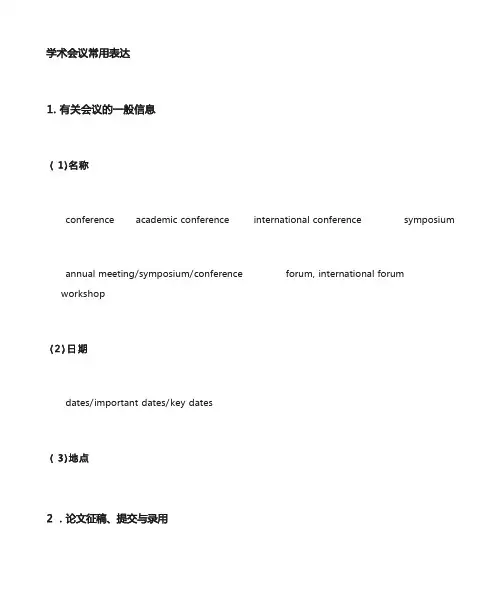
conference academic conference international conference symposiumannual meeting/symposium/conference forum, international forum workshopdates/important dates/key dateslocation/venue conference location/venueissues/themes/(main)topics/scope of conference conference themes/topics topic of interestscall for abstract/proposal/paper paper deadline deadline for abstract/full paper/proposal submissionsubmission deadlinedate for mortification of acceptance by…deadline for authors notificationdeadline/closing date for registration informationregistration fees and itemstelegraphic transfer onlyconference schedule/program final conference programdeadline extendedPaper acceptance/rejection will beinformedcamera ready versiondeadlineregistration form registration official invitation letterbank transferpreliminary conference program opening ceremony/sessionbank draft/check paymentkeynote session/parallel session/tutorial session keynote speechoral presentation poster presentation tea/coffee break(buffet) lunch/(buffet)supper (welcome)banquetopening introduction to speaker theme/paper presentation question and answer comment on speaker closing学术报告之后的问答讨论环节( QuestionandAnswer Session )是同行之间交流的良好机会,双方可以针对报告中的具体问题进行探讨回答讨论环节可以让报告人通过互动及时地获得信息反馈并可以把在讨论中或得的建设性建议用于下一步的工作,因此对科研工作有很大的促进作用。
国际学术会议常用语(英语)学术会议常用表达1. 有关会议的一般信息(1)名称conference academic conference international conference symposium annual meeting/symposium/conference forum, international forum workshop (2)日期dates/important dates/key dates(3)地点location/venue conference location/venue(4)主题issues/themes/(main)topics/scope of conference conference themes/topicstopic of interests2.论文征稿、提交与录用call for abstract/proposal/paperpaper deadlinedeadline for abstract/full paper/proposal submissionsubmission deadline deadline extended5. 会议具体细节opening introduction to speaker theme/paper presentationquestion and answer comment on speaker closing6.学术会议的问答讨论环节口语学术报告之后的问答讨论环节(Question and Answer Session)是同行之间交流的良好机会,双方可以针对报告中的具体问题进行探讨(1)答问的方式与技巧回答讨论环节可以让报告人通过互动及时地获得信息反馈并可以把在讨论中或得的建设性建议用于下一步的工作,因此对科研工作有很大的促进作用。
对于如此重要的环节,报告人在报告之前应进行必要的准备,尽可能地保证这一环节完整、流畅地进行,一般应注意以下几点。
国际学术会议常用语(英语)第一篇:国际学术会议常用语(英语)学术会议常用表达1.有关会议的一般信息(1)名称conference academic conference annual meeting/symposium/conferenceinternational conference forum, international forumsymposium workshop(2)日期dates/important dates/key dates(3)地点location/venue conference location/venue(4)主题issues/themes/(main)topics/scope of conference topic of interestsconference themes/topics 2.论文征稿、提交与录用call for abstract/proposal/paperpaper deadline deadline for abstract/full paper/proposal submission submission deadlinedeadline extended date for mortification of acceptance Paper acceptance/rejection will be informed by… deadline for authors notificationcamera ready version deadline 3.会议注册deadline/closing date for registration registration fees and itemstelegraphic transfer onlyregistration form official invitation letter bank transferregistration informationpayment bank draft/check 4.会议进程及内容conference schedule/programpreliminary conference programfinal conference programopening ceremony/session keynote session/parallel session/tutorial sessionkeynote speech oral presentationposter presentationtea/coffee break(buffet)lunch/(buffet)supper(welcome)banquet5.会议具体细节openingquestion and answerintroduction to speaker comment on speakertheme/paper presentation closing 6.学术会议的问答讨论环节口语学术报告之后的问答讨论环节(Question and Answer Session)是同行之间交流的良好机会,双方可以针对报告中的具体问题进行探讨(1)答问的方式与技巧回答讨论环节可以让报告人通过互动及时地获得信息反馈并可以把在讨论中或得的建设性建议用于下一步的工作,因此对科研工作有很大的促进作用。
Good morning! It is a great pleasure to be here at this International Academic Conference and have the opportunity to share my thoughts and insights with all of you. Today, I would like to focus on the topic of "The Impact of Artificial Intelligence on Education in the 21st Century".As we all know, the 21st century is a century of rapid development and innovation, and artificial intelligence (AI) is one of the most significant advancements in this era. The integration of AI into various fields has brought about profound changes, and education is no exception. In this speech, I will discuss the following aspects: the definition and development of AI, the impact of AI on education, and the challenges and opportunities it presents.Firstly, let's talk about the definition and development of AI.Artificial intelligence refers to the simulation of human intelligenceby machines, which can perceive, reason, learn, and make decisions. The development of AI can be traced back to the 1950s when John McCarthy, an American computer scientist, first proposed the concept of AI. Since then, AI has undergone several stages of development, including thebirth of AI, the crisis of AI, the renaissance of AI, and the current rapid development of AI.In the field of education, AI has been applied in various aspects, such as intelligent teaching, intelligent assessment, and personalized learning. Intelligent teaching refers to the use of AI technology to design and implement teaching plans, which can adapt to the needs of different students. Intelligent assessment uses AI algorithms toevaluate students' learning progress and provide timely feedback. Personalized learning refers to the use of AI technology to create individualized learning plans for students, enabling them to learn at their own pace and in their own style.Secondly, let's discuss the impact of AI on education. On the one hand, AI has greatly improved the efficiency and effectiveness of education. With the help of AI, teachers can focus on guiding students' learningand developing their thinking abilities, instead of spending time on repetitive tasks such as grading. Students can also benefit from AI technology by obtaining more personalized and targeted learningresources. On the other hand, AI has brought about new challenges to education. For example, the rapid development of AI technology may lead to a decline in the importance of human teachers, and the increasing use of AI in education may cause students to lose the opportunity to communicate and interact with their peers.Thirdly, let's explore the challenges and opportunities presented by AI in education. Challenges include the following aspects:1. The quality of AI technology: As AI technology continues to develop, the quality of AI products will also vary. In the field of education,the use of low-quality AI products may have a negative impact onstudents' learning.2. The digital divide: In the process of integrating AI into education, the digital divide may become more prominent. Students from disadvantaged backgrounds may not have access to high-quality AI resources, which will further widen the gap between students.3. Ethical issues: The use of AI in education raises ethical issues,such as the protection of students' personal information and the prevention of AI bias.Opportunities include the following aspects:1. Innovation in education: AI technology can promote the innovation of educational methods, teaching materials, and assessment methods, and improve the overall quality of education.2. Improvement of educational equity: AI technology can help to break through the barriers of time and space, making high-quality education resources more accessible to students from all over the world.3. Development of educational talent: AI technology can provide students with more personalized and targeted learning experiences, helping themto develop their unique talents and potential.In conclusion, the impact of AI on education is both profound and complex. While AI technology has brought about significant benefits to education, it also presents new challenges. As educators and researchers,we need to actively explore and solve these challenges, and seize the opportunities brought by AI technology to promote the development of education in the 21st century.Thank you for your attention, and I look forward to your comments and suggestions.。